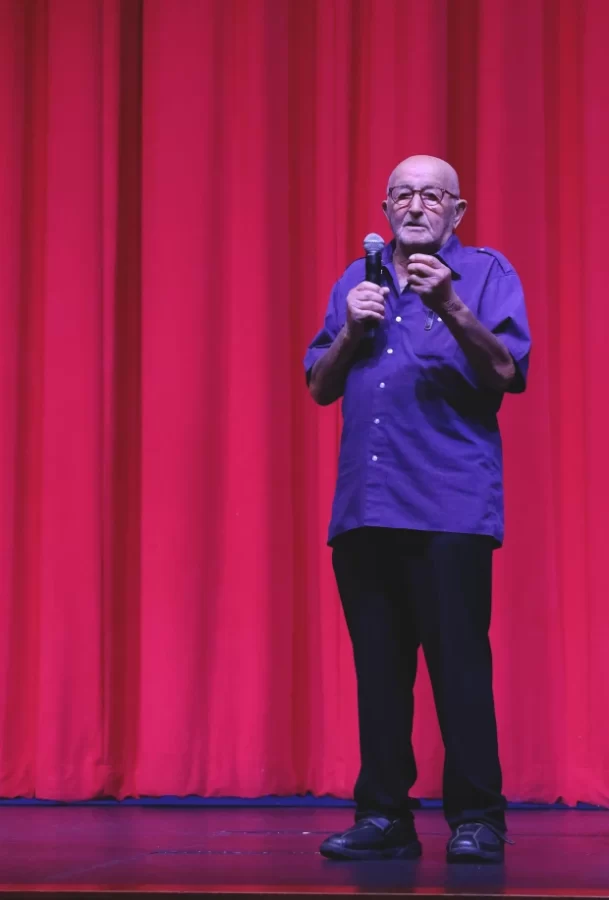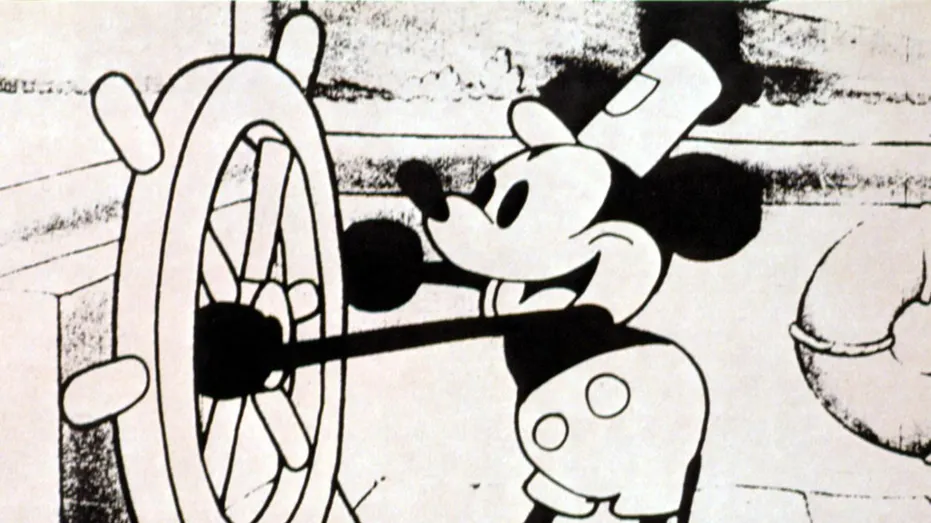Holocaust Survivor Visits Santiago High School
February 27, 2023
“People should not stay silent.”
The 93-year-old Holocaust survivor, Sam Silberberg, shares his “time spent in hate” with the students at Santiago High School to do just that. Not stay silent.
The Holocaust, otherwise known as the Shoah, is fading from memory as we get farther away from this tragic mark in history. The pain, the suffering, and the evil are being forgotten in today’s world, and remembering our past mistakes will only help us to avoid them in the future. So to be forgotten means we run the risk of taking this dangerous path once again, and that is why Sam Silberberg has pledged not to stay silent.
Although it is not easy, this brave survivor chose to share the story of his experience with the bloody genocide of Jews during World War II, where more than 6 million Jewish men, women, and children were systematically murdered and sent to concentration camps. He shared the story of crimes against humanity, ethnic cleansing, and mass killings that he managed to survive; he shared the story of unimaginable terrors and brutalities that have shaped his life forever and will continue to shape the lives of all humanity forever.
Beginning with 105 members of Silberberg’s family, the Holocaust left them as 4– this can only describe the criticalness of this event. The frightening reality began being carved into history in 1939 when Sam Silberberg was only 9 years old, Poland was invaded and his hometown was occupied by Germans. In 1945, he was sent on a death march with hundreds of other Jews.
As the Holocaust began, he believed he would be destined for Auschwitz. He and many other Jews in his ghetto concealed themselves from the Germans in a “hiding place”, where policemen heard the cries of a baby and captured him and the other occupants. The desperation to not be caught by the Nazis was shown through the suffocation of this baby in an attempt to silence their cries.
To avoid being sent to Auschwitz, 12-year-old Sam Silberberg tricked the Nazis by standing on a block at the assembly place of more than 36,000 people to seem taller than he was. He and his father also lied that they were construction workers in order to be put into the bodied line, resulting in being sent to a labor camp rather than a death camp. In fact, women, children, and disabled bodies were sent to death camps and men were sent to labor camps because they had the ability to carry out harder work. He and his father began in Annaberg and were then transferred to Blechhammer where his plots of escape first developed, and he even managed to briefly break free, yet turned back around to avoid the death of others in the camp. It was threatened that “if one person escapes the concentration camp, ten are killed”, and he did not want to save his life at the expense of others.
When Silberberg was walking through the snow back to his camp, a miracle allowed him to come across his mother again, meaning she was alive. She slipped a note of an address in Neisse into his father’s pocket, creating enough hope in them to try and contact her, so they chose to trust their German boss who was described as “not as committed to the Nazi cause as others”, and ended up successfully getting into contact with his mother, learning that she was working as a Christian in a monastery. He would reunite with her in the winter of 1945.
In the time spent in the concentration camps, Silberberg not only faced physical challenges but mental challenges as well. Silberberg contemplated on suicide many times, as there was “no reason to live” in a period of constant atrocities. He told his father, “I’m better off committing suicide”, but his hope was always restored with his father’s optimism in return. “You have to be an optimist”, he said, “faith always prevails”. To have faith and to fight were the principles the Silberbergs valued throughout their experiences.
As the Russian armies approached, the Nazis wanted to censor the evidence of cruelty that they placed on the prisoners and sent them on a death march, which Silberberg escaped and later found his mother in Neisse. His father, unfortunately, died, leaving just him and his mother to survive these tragic events.
Ultimately, Silberberg described these experiences to be an “unbelievable sight of agony and pain”, stating, “It was a miserable life, I was lucky enough that I had God’s help.” His motivation was to stay positive and to have faith in God.
After liberation, Sam Silbeberg decided that he had to fight in the Palestine war, truly reflecting his strength of character and bravery of heart. He met his wife whom he’s been married to for 64 years now and immigrated to the U.S. in 1952. He also wrote the book, “From Hell to the Promised Land: A Boy’s Daring Escape from a Nazi Concentration Camp”, describing life under Nazi occupation and his experience of two and a half years in concentration camps. Sam Silberberg has lived through unimaginable atrocities, yet through his resilience and his faith, he still stands today strong and willing to share his story with the world.
Silberberg’s annual speeches to Santiago Highschool provide a chance for students to not only learn of the first-hand experiences of the tragic Holocaust events but also learn why it is so important to remember and pass these stories on to future generations.
“It is not common to find survivors who are around anymore to tell their stories — and especially ones who are strong enough to come and speak to students in person,” Santiago teacher Brooke Wheeler wrote in an email. “It is truly an amazing and once-in-a-lifetime experience for our students and one that is definitely fleeting.”
Thank you for sharing your story, Mr. Silberberg. It will forever be remembered.












